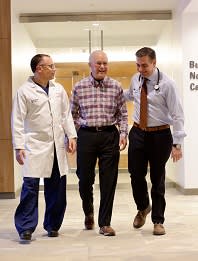John B's Story (Aortic Dissection, or Tear in Aorta)
Published on January 29, 2018
 John Bonora never thought he would experience a life-threatening tear in his heart just before his daughter's wedding. A little over a week before the rehearsal dinner, the 67-year-old woke up feeling extreme tightness in his upper chest and intense pain in his throat.
John Bonora never thought he would experience a life-threatening tear in his heart just before his daughter's wedding. A little over a week before the rehearsal dinner, the 67-year-old woke up feeling extreme tightness in his upper chest and intense pain in his throat. "The pain was unlike anything I had ever felt before. So I called my sister, a retired nurse, who told me to go to the emergency room," said Bonora, a resident of Stamford. "Before I knew how serious the condition was, I got i my car to get myself to the hospital."
Only a few minutes after he left home, Bonora says he started sweating profusely. Feeling lightheaded and like he was going to pass out, he pulled into the parking lot of the Shippan Point fire station where firefighters rushed to his aid and called Stamford Emergency Medical Services (EMS). The ambulance rushed John to Stamford Hospital's Emergency Department where he was brought to the Cardiac Catheterization Lab. Interventional Cardiologist Ted Portnay, MD, Director of Cardiac Catheterization, quickly ruled out a heart attack but discovered a tear in his aorta, which necessitated emergency surgery.
"An aortic dissection is a tear in the blood vessel. When a tear occurs, it is probably the most pain a person has ever experienced," said Michael Coady, MD, MBA, MPH, Chief of Cardiac Surgery and Co-director of the Stamford Health Heart & Vascular Institute (HVI). "As the tear gets bigger, the wall of the aorta gets thinner. When this occurs in the ascending aorta, like in Mr. Bonora's case, you have to operate emergently because the mortality rate is very high."
David Yuh, MD, Chair, Department of Surgery, says that aortic dissection is just one problem that can present in the aorta. The aortic valve can also have issues that generally fall into one of two categories: hardening or narrowing of the valve or when the valve leaks. These conditions can be treated with open heart surgery or less invasive approaches whenever possible.
"We perform a large number of valve operations here more than a typical community hospital, and this expertise enabled us to acquire the technology to perform the transcatheter aortic valve replacement (TAVR)," said Dr. Yuh. "In addition to our extensive experience, we provide patient care in a much more intimate setting, where our physicians are very focused on knowing their patients and providing a high level of care."
Bonora was brought to the operating room where doctors, nurses and an anesthesiologist worked for nine hours to complete his open-heart surgery. "With blood accumulating around John's heart, we had mere seconds to get to his heart, relieve the tension and put him on cardiopulmonary bypass. We then removed the torn portion of his aorta and replaced it with a durable synthetic material called Dacron," said Dr. Coady. "This procedure is straightforward for our team, as we are well-suited to handle these types of high-risk cases. Our success is illustrative of the skill set of the surgeons here and the teamwork it takes to carry the patient through to recovery."
After surgery, Bonora woke up in the intensive care unit and spent six days in the hospital recovering. Though focused on healing, he says he couldn't wait to be there for his daughter's big day. Thanks to the doctors at Stamford Hospital, and other emergency personnel, he was able to walk his daughter down the aisle 10 days later. "Dr. Coady and Dr. Portnay--those guys are clearly miracle workers," said Bonora. "Timing was everything and they saved my life."
The cardiac emergency was a shock to Bonora and his family because he never experienced any heart issues and lived an active lifestyle. In fact, every year, he runs the Shelter Island 10K, training for three to five miles per day, several days a week. Now Bonora is working to get back on the road, getting better each day in rehabilitation at Stamford Health's Tully Health Center.
"I'm making progress every day. Stamford Hospital and the whole team is such a resource," added Bonora. "You don't have to go to New Haven or New York City. In my experience, knowing that time is precious, this hospital is vital to our community."

